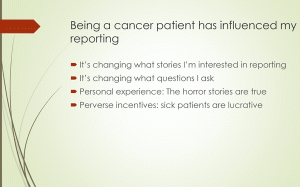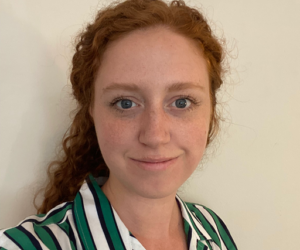 Alexandra Glorioso, a Florida health reporter for Politico, joined AHCJ for a webcast about what being diagnosed with stage 2 breast cancer at age 31 taught her about reporting on health care.
Alexandra Glorioso, a Florida health reporter for Politico, joined AHCJ for a webcast about what being diagnosed with stage 2 breast cancer at age 31 taught her about reporting on health care.
Before we say anything else – after a rough year with chemo, surgery, and radiation – Glorioso is doing well. She’s in remission (and planning her wedding!).
Based in Tallahassee, she’s professionally focused on the state legislature, and the governor – budgetary and political fights about health policy including the ACA and Medicaid (which Florida has not expanded.) Not surprisingly, she’s become more focused on the patient experience – particularly the uninsured. She said she had never fully appreciated their vulnerability, their struggle to get ongoing care if they are threatened with a life-threatening illness, or are coping with a chronic disease.
Savvier than the average American about the health care system – and able to count on the advice of her father, a scientist – she was nevertheless overwhelmed by having to navigate that system, something that now colors how she thinks about her job. Getting to the right doctors, finding out what was covered, getting the necessary tests and access were all difficult, and have made her as a reporter appreciate how much more daunting it is for people who aren’t dealing with health care professionally day in and day out. She’s very active on Twitter, with open DMs, and hears from a lot of other cancer patients, which has been both enriching to her as a reporter and helpful to her as a patient.
She’s become more aware of fraud in the system, of “bad actors” and of incentives that encourage doctors and hospitals to “conspire against the people they are suppose to be treating.” She thinks we don’t pay enough attention to fraud – and it’s something she wants to cover more of (and she’s got strong data skills which may help her).
Glorioso is sensitive to conflicts of interest – she and her editors (note: we work for different branches of Politico so I’m not one of her editors) have discussed that line between reporting and advocacy, and how to handle it when someone reaches out and tries to clear a pathway for her (not financially of course but just making things happen faster or with less aggravation and obstacles.) “I’m still a reporter first,” she said.
After a year of treatment, she’s still not always able to understand all the details of her hospital bills, or remember what doctor she saw on a specific day many months ago, and why he or she charged $1,500. (Under her employer-sponsored coverage, Glorioso said she has a $2,000 annual deductible so after reaching that point, she doesn’t struggle with the bills so much.)
One question I had ready for her – how does she interview and report on the so-called “Young Invincibles, “ the 20- or 30-somethings who don’t think they need insurance, who don’t think it’s worth the cost, or are satisfied with a plan that provides less than comprehensive coverage. I was surprised to find out that she herself had been a Young Invincible! She had gone through a time in her 20s when she was not insured, and she hadn’t been to a doctor in about five years. Even when she discovered what turned out to be a symptom of cancer, her fiancé had to push her – really insist – that she see a doctor. She did so in the “nick of time.” She had stage two cancer – but was awfully close to stage three, which is more dangerous. (She’s also gotten better about seeing her dentist regularly!)
The first year of treatment was all-consuming. As she mends, she said she finds she’s confronting more of the psychological or “existential” aspects of being a cancer patient. But as she gains strength, she’s also ready to take her insights about a health care system “that’s just a mess” and double down on the job.







